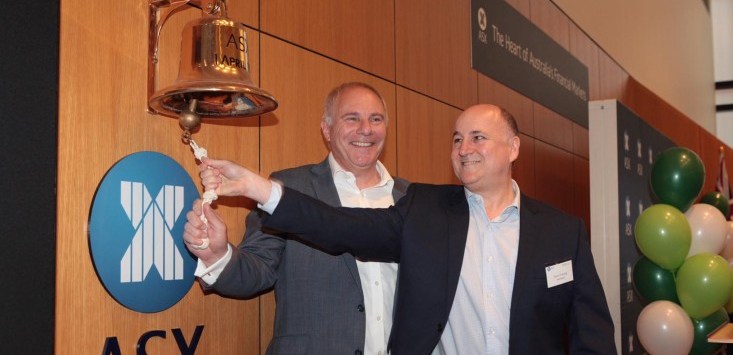
Booktopia co-founders Tony Nash and Steve Traurig ringing the ASX bell. Source: supplied.
When Booktopia went public last week, more than 250 employees received $1,000 in shares in the business. And, while that was a rewarding step to take, it was also part of Tony Nash’s four-part foundation for building a sustainable business.
Thursday’s $43.1 million ASX debut saw all employees who had been with Booktopia for more than 12 months gifted shares in the newly listed company.
It was, of course, a way of giving back to those people who helped build the business, Nash tells SmartCompany.
“That’s the kind of two-way bond you want to have.”
Up until the very last day, the HR team was chasing people who hadn’t signed off on the paperwork, he explains.
In the end, “we got everyone across the line”.
But, this also plays into Nash’s leadership style. We’ve all heard of a win-win situation — he strives for a four-way win.
First, the company has to win. If the business isn’t making profit, it may well go out of business, which benefits no one, he explains.
Then, customers have to win — in this case, getting a good price on products, and fast delivery.
Thirdly, suppliers have to be in a position to win.
“You can’t be screwing your suppliers, so they’re able to continue to build their business,” Nash says.
Finally, the employees need to win too.
“That’s the key,” he says.
If you’re missing one of those ‘wins’ then it’s not a sustainable model.
Nash’s comments follow Booktopia’s launch on the ASX last week, with a share price of $2.30.
On Friday, the share price hit $3, and at the time of writing, the share price is sitting at $2.99.
The founder likens the experience to a wedding day.
“Your cheeks are sore from smiling … You spend months planning it, you’re exhausted.”
Then, the next day, when it’s all over, “the marriage starts”, he says.
“You’ve got full disclosure, you’ve got to keep your integrity, you have to keep your word, and it’s all before you.
“The IPO is a great experience, but it’s just a milestone along the way of the journey of your business.”
$500 million revenues ahead
Nash says he’s always known the company was going to be big. But, now was the time to capitalise on a swell in e-commerce activity.
The original plan was to list in late-2021, he adds. But, the pandemic has shone a spotlight on e-commerce as a growth sector, meaning the team could expect a “pretty reasonable” valuation.
“The appetite was there.”
And, this isn’t a trend he sees abating any time soon.
“It’s not a tsunami inundation where it goes all the way in and then slowly recedes back again,” he says.
“Because it’s gone on for so long, Australians have had a chance to explore and try shopping online.
“It’s going to hold its course.”
In the US, e-commerce is expected to account for about 12.4% of all retail for 2020, according to Statista. In Europe, that’s projected to be more than 16%.
Australia has been “lagging behind”, Nash says.
So, growth here was always on the horizon, it was just a matter of time.
One of the main reasons this market was trailing was that retailers in other parts of the world had to level up much earlier, in order to compete with the likes of Amazon.
But also, the traditional retail leaders in Australia simply haven’t come from digital backgrounds, Nash explains. There wasn’t necessarily an understanding of the opportunity at hand.
Post-COVID-19, that’s all changing, and Nash is “very confident” about 2021.
“We’re not expecting to smash it out of the park like we have done for the past 10 months,” he says.
“But, we expect it to be pretty strong.”
According to Booktopia’s prospectus, the business has seen compound annual revenue growth of 26.4% since 2015.
In the last financial year, it saw revenues of $165.8 million. For 2021, that’s projected to hit $204.5 million.
Nash isn’t able to elaborate on his predictions for the next year or so, but he does say the business is in good stead to continue its growth trajectory, hitting revenues of between $300 million and $500 million within the next three to five years.
“It’s a 2.5 billion industry in Australia,” he says.
“I’m confident we can get to those levels as we continue to invest in stock, automation, software, our team.
“It’s all there for the taking if we put in the effort.”
Handpicked for you

Hipages becomes latest Aussie startup to IPO on the ASX — here’s how it got there



COMMENTS
SmartCompany is committed to hosting lively discussions. Help us keep the conversation useful, interesting and welcoming. We aim to publish comments quickly in the interest of promoting robust conversation, but we’re a small team and we deploy filters to protect against legal risk. Occasionally your comment may be held up while it is being reviewed, but we’re working as fast as we can to keep the conversation rolling.
The SmartCompany comment section is members-only content. Please subscribe to leave a comment.
The SmartCompany comment section is members-only content. Please login to leave a comment.